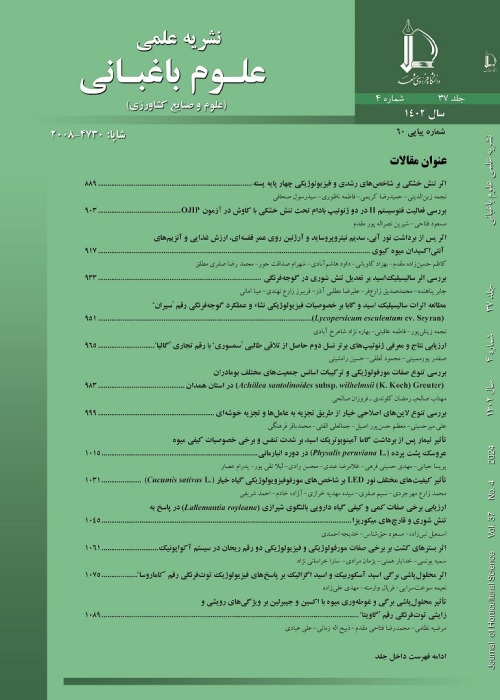Effect of Vermicompost and Nitroxin on Vegetative Growth and some Biochemical Properties of Rosemary Herb (Rosmarinus officinalis L.)
Author(s):
Abstract:
Introduction
Rosemary (Rosmarinus officinalis L.) is a perennial, ever green and fragrant plant belongs to Lamiaceae family. Vegetative parts of this plant have essential oil and compounds with anti¬oxidant and antibacterial properties which are used extensively in pharmaceutical, food and cosmetic industries. The use of biofertilizers such as vermicompost and Nitroxin could have beneficial effect on production of rosemary by increasing the production of plant growth hormones and the availability of macro and micro nutrients in growing media.Materials And Methods
The effect of vermicompost and Nitroxin biofertilizers was investigated on growth, yield, the amounts of photosynthetic pigments, flavonoid, essential oil percentage and yield of rosemary. The experiment was based on a randomized complete block design with two factors, including vermicompost (0, 10, 20, 30 and 40% w/w) and Nitroxin (inoculated and non-inoculated with Nitroxin) with four replications. This research was done at Sari Agricultural Sciences and Natural Resources University, Sari, Iran, in 2012-2013. Uniform one-year old rooted rosemary cuttings were selected for this experiment. Before planting, rooted cuttings were treated in diluted Nitroxin solution in water (1:10) for 10 minutes. After planting, rosemary plants were fertilized twice by Nitroxin for every 45 days according to the producing company recommendation. During growth period, irrigation was done according to plants requirement. At the end of experiment, parameters such as plant height, shoot fresh and dry weight, root dry weight, chlorophyll a, total chlorophyll, leaf flavonoid and essential oil yield were measured. Data was analyzed using standard analysis of variance (ANOVA) using the general linear models procedure of SAS, (version 9.1; SAS Institute, Cary, N.C.). Differences among means were tested by least significant difference (LSD) (p ≤ 0.05).Results And Discussion
Obtained results showed that the application of different levels of vermicompost and Nitroxin inoculation and their interactions had significant effect on some rosemary morphological and physiological properties such as plant height, shoot fresh and dry weight, root dry weight, chlorophyll a, total chlorophyll, leaf flavonoid and essential oil yield. The interaction of vermicompost and Nitroxin were highly significant for shoot weight. The highest fresh weight (71.55 g) for each plant were obtained from 40% vermicompost with Nitroxin inoculated treatment. The lowest fresh weight (45.62 g and 44.4g) belonged to 10% vermicompost and control treatments, respectively. Shoot dry weight yield was also affected by vermicompost with Nitroxin interaction and was highly significant. The highest dry weight (31.37 g) was obtained from 40% vermicompost with Nitroxin inoculated treatment while the lowest dry weight (18.68 g and 18.79 g) was observed in control and Nitroxin treatment, respectively. The amount of chlorophyll a and total chlorophyll were affected by vermicompost with Nitroxin interaction too. The highest amount of chlorophyll a (25.89 mg/g) was observed in 30% vermicompost treatment. The highest amount of chlorophyll b (2.13 and 1.81 mg/g) belonged to 20% and 30% vermicompost treatments, respectively and , the highest amount of total chlorophyll (27.7 mg/g) was measured in 20% vermicompost in combination with Nitroxin inoculated treatment. The highest amount of leaf flavonoid (6.25 mg/g) was determined in 10% vermicompost with Nitroxin inoculated treatment. The highest essential oil yield (0.263 and 0.272 g per plant) was obtained from 20% and 30% vermicomposts treatments, respectively. According to the presented results, amendment of growing media with vermicompost and Nitroxin inoculation significantly increased quantity and quality properties of rosemary.Conclusions
The presented results showed that the use of vermicompost, and Nitroxin separately or in combination have positive effect on growth yield, pigments formation and essential oil yield of rosemary. The increased fresh and dry yield of rosemary in this study could be the result of optimum condition of growth media provided by vermicompost. The use of vermicompost increases water holding capacity and better ventilation environment for plant roots. In addition, the presence of vermicompost in growing media provides greater nutrient availability for plants and therefore increases plant fresh and dry yield. This greater nutrient availability could be due to increased microbial population and their activities in vermicompost- amended growth media.Keywords:
Language:
Persian
Published:
Journal of horticulture science, Volume:30 Issue: 2, 2016
Pages:
178 to 184
https://magiran.com/p1607264
دانلود و مطالعه متن این مقاله با یکی از روشهای زیر امکان پذیر است:
اشتراک شخصی
با عضویت و پرداخت آنلاین حق اشتراک یکساله به مبلغ 1,390,000ريال میتوانید 70 عنوان مطلب دانلود کنید!
اشتراک سازمانی
به کتابخانه دانشگاه یا محل کار خود پیشنهاد کنید تا اشتراک سازمانی این پایگاه را برای دسترسی نامحدود همه کاربران به متن مطالب تهیه نمایند!
توجه!
- حق عضویت دریافتی صرف حمایت از نشریات عضو و نگهداری، تکمیل و توسعه مگیران میشود.
- پرداخت حق اشتراک و دانلود مقالات اجازه بازنشر آن در سایر رسانههای چاپی و دیجیتال را به کاربر نمیدهد.
In order to view content subscription is required
Personal subscription
Subscribe magiran.com for 70 € euros via PayPal and download 70 articles during a year.
Organization subscription
Please contact us to subscribe your university or library for unlimited access!


